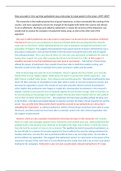How accurate is it to say that parliament was a key prop to royal power in the years 1399-1509?
The monarchy in the medieval period was of great importance, as they commanded the running of the
country, and were supposed to ensure the strength of the English both within the country and abroad.
To do so efectvely, the kings were aided by parliament; in assess the accuracy of this statement, you
would need to analyse the examples of parliament being using, as well as the other side of the
argument.
One way in which parliament was a key prop to royal power can be seen by the usurpaton of ichard
II by Henry IV; Henry IV uses parliament to denounce ichard whilst also ensuring that they back his
weak claim to the throne, whilst exploitng ichard II’s lack of popularity amongst the parliament and
populaton of England. This suggests that parliament had a great amount of power and therefore was a
key prop to royal power, seen by how ichard’s fall from power was partly due to the lack of support
from the government. This is also seen by Henry VII, who also uses parliament to legitmise his claim by
having them support his cause afer usurping the throne from ichard III in 1485; in this respect, it
would be accurate to say that parliament was a key prop to royal power – had neither of these kings
utlised the power of parliament, they wouldn’t have been able to hold their positon as king, and
therefore would not be able to maintain their power among the nobles and the public.
Both of these kings also used the Acts of Atainder, Henry IV against the Percy family, so to stop the
threat of the an over-mighty subject, whilst Henry VII used it to prevent the Yorkist supporters - who
didn’t favour a united Tudor house - from rising up and overthrowing him. This point is furthered by how
Henry VII then used Acts of resumpton to take their lands in order to not only increase his income, but
decrease his oppositon’s power; this would not have been possible without consent of parliament,
which implies that parliament were happy to enable this, showing their involvement in the monarch’s
choices. Edward IV also used the Acts of Atainder against his own brother George, Duke of Clarence, as
he was becoming an increasingly over-mighty subject who became more invested with his own politcal
stance than his dutes Edward gave him – this would also not have been possible without the King, and
as his brother, most likely persuaded Edward to imprison and less the Duke’s threat towards him and his
power. You can infer from these points that it would be accurate to say parliament are a key prop in
upholding the royal power, as without parliament, neither of these kings would have been able to usurp
the throne, and they would not have been able to maintain control over their internal oppositon with
the support of government.
However, there are also examples of parliament not being necessary to the monarchy; this includes
Henry V’s reign and campaigns against France. During the one hundred years war, whilst parliament did
partally fund it, they became more reluctant to throughout his reign, and so Henry V raised the money
from the land he secured in France to do so instead. This signifies the lack of necessity of parliament, as
he was stll able to contnue the invasion against the French without the need for asking parliament for
taxaton and loans; not only this, but as parliament did not have a say on foreign policy, he was able to
do this without any oppositon. This suggests that parliament weren’t as a key factor in the power of the
monarchy, because if they were then it is more likely that they would have had a say on how to go about
funding for his campaigns. Parliament is also not seen as partcularly relevant during Henry VI’s reign,




